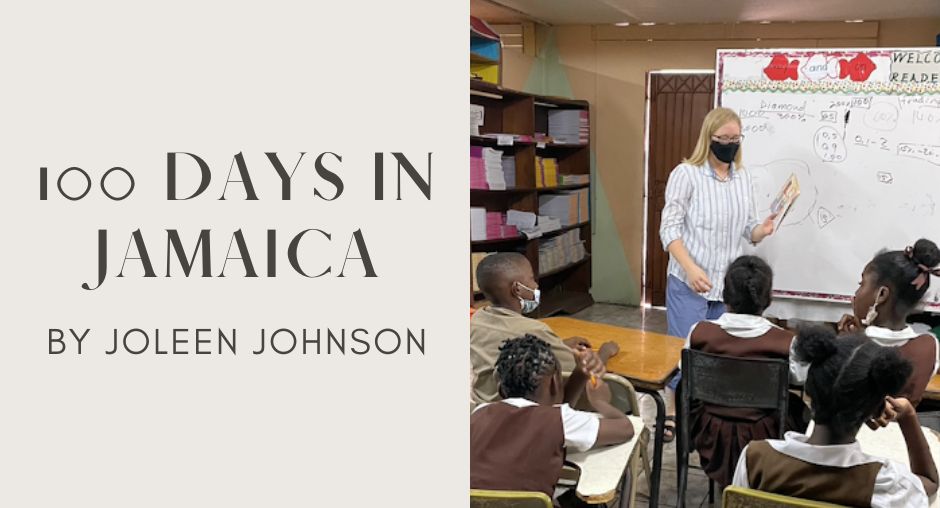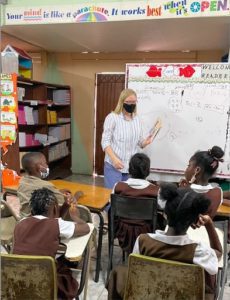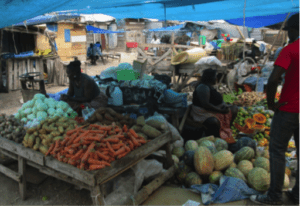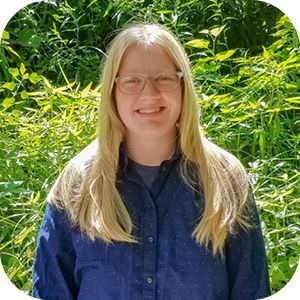100 Days in Jamaica

Editor’s Note: Joleen Johnson reflects on her first 100 days as an Overseas Lay Missioner in Jamaica.
I’ve officially been in Jamaica for three months now. In fact, I calculated it, and my 100th day in Jamaica was June 9th, 2022. My time here has felt like it’s just flown by, and I really can’t believe I’ve hit triple digits in my number of days here! So what have I been up to while in Kingston, Jamaica for the last 100 days? This blog serves as an attempt to share what I have been doing on a regular basis, and what each of those experiences has taught me already.
was June 9th, 2022. My time here has felt like it’s just flown by, and I really can’t believe I’ve hit triple digits in my number of days here! So what have I been up to while in Kingston, Jamaica for the last 100 days? This blog serves as an attempt to share what I have been doing on a regular basis, and what each of those experiences has taught me already.
Three days per week I go to an elementary school (which was started and is run by the Franciscan Sisters of Allegany, whom I live with here in Jamaica). There, I accompany the reading resource teacher in assisting students who benefit from a little extra reading help. She teaches them lessons to practice reading and sounding out words. I assist by milling around and helping all students stay on track, answering questions, and providing help to students, as well as working with them one-on-one. I often get asked which grade I teach, but I see all different classes and grades at school. Small groups of students from each grade come to the library to work on their reading skills with us and to get academic support.
What I’ve learned: The weeds and the wheat grow together. Each and every person is an incredible creation who is unique and intricately designed, unrepeatable, and has been loved by God into existence. In Jesus’ parable (in Matthew 13:24-30) a man planted good seeds of wheat in his field, but then the enemy came and planted weeds in the man’s field. When the wheat started to grow, so did the weeds. But the man told those working in his field not to pull the weeds up because the wheat could prematurely come up with it too. Each and every person has beautiful gifts and talents which reveal God’s fingerprints in us when we allow God to shine through us and grow us into the valiant and healthy “wheat” that He intends us to be. All those great things about each person are like the wheat in Jesus’ parable. Yet, each and every person also has “weeds” in them: the evil in us and times when we sin and fall short, way short, of what God has called us to be.
The weeds and the wheat grow together in each person. But Jesus said not to throw out the wheat because of the weeds. Each and every person encompasses both. Sometimes good people make bad decisions. The students at the school I attend have taught me about this notion. There have been times when a student is displaying very disruptive behavior at the beginning of class (the weeds), yet by the end of class, they are kindly helping their fellow classmate read difficult words and sharing their pencil sharpeners (the wheat). All in the same kid, all in the same hour. The weeds and the wheat grow together; in the kids at school, within my own heart, and in each and every person. But every person is worth giving grace to because they were created for the wheat. Essentially, some of these kids have taught me patience; to see their wheat before their weeds. They have taught me to trust in the hope that the wheat prevails. Every time.
Once a week, I typically go to Coronation Market, the largest open air outdoor market on the island. The prices are cheaper than the grocery stores, and the produce is very fresh because most of the food has been grown and freshly picked in Jamaica. I have had the blessing of getting to know and converse with a few of the same local vendors each week.
What I’ve learned: I’ve been introduced to many new fruits, such as star apples, naseberries, papayas, numerous varieties of mangoes, plantains, breadfruit, jellies from coconuts, jackfruit, ackee, sorrel, Jamaican apples, and sugar cane. At the market, I’ve also been exposed to lots of Patois, the English creole that serves as the local language in Jamaica. Likewise, I’ve learned a lot about Jamaicans as a people. The market has taught me that Jamaicans are a people who look out for each other, a people who love to laugh, and a people who can trust each other. The vendors who we know well and ritually purchase from are very honest and have taught me about the Jamaican cultural values of kindness, hospitality, general care for others, and a desire to help each other out.
Once a month, I help the Sisters whom I am staying with during their food distribution to individuals facing poverty. We create 180 bags filled with non-perishable cans of different foods like mackerel (fish), corned beef, Vienna sausages, sardines, a bag of rice, and a bag of cornmeal, as well as a bar of soap. Each person who is registered with the Sisters, those experiencing economic hardship or marginalization due to a disability or medical condition, receives a bag of these canned goods each month. The Sisters also work with a local pharmacy to ensure that these individuals have access to the prescription medications that they need. On the morning of the distribution, I often help load and unload the bags to take them to our front gate.

What I’ve learned: The individuals receiving these bags of food have taught me about true gratitude. I’ve seen such thankfulness and appreciation that some people are almost moved to tears in gratitude as they are given this supplemental food. I’ve also learned that there are many different circumstances that can place a person in an economic situation of vulnerability. I’ve learned not to make assumptions about people or how or why they got to the situation that they are in, because I don’t know each person’s full story. Nevertheless, I’ve also been given the opportunity to consider some of the implications of life under economic pressure, and the attitudes that this kind of continual stress can invoke.
Finally, once per week I go to church with very lively music. Then I am taken to a home for kids experiencing physical and cognitive disabilities. We go to the first dorm, which houses individuals who are bedridden, and help feed the kids who cannot feed themselves. Some individuals are spoon fed rice, meat, and vegetables. Others cannot chew, so we assist with bottle feeding them a blended formula. When everyone in this dorm is fed, we typically move on to the dorm for boys under the age of 15, who are often up and about and begging us to take them outside to play soccer/football. Sometimes they watch a movie, and I sit with them and chat as we are able. Other times, we build creations with Lego-like blocks. Then in the next dorm, we sometimes walk with the older boys so they can have extra support as they move about the building. Other times, we just say hello to them and communicate in whatever ways we can. Their smiles are priceless and are in abundance. Spending time at this home is surely a highlight of my week.
What I’ve learned: The beloved children of God who live at this home have taught me a great deal about God, about God’s love for His children, humanity, the dignity of human life, and about inherent value and worth. Yet, no one living there has spoken a word about these concepts to me verbally. Through assisting these brothers and sisters in the first dorm to eat, I’ve found myself reflecting on the reality and implications of “disabilities” compared to what I’ve perceived to be God’s perfect design for His human beings. What does this God who lovingly gazes at the humans He so delicately created, and affirms that His creation of them is “very good” (Genesis 1:31), think of the fact that these little ones at whom I am gazing cannot move their fingers, arms, legs, or feet, and cannot speak like Adam and Eve could?
Then as I gaze a little longer upon the inhabitant of the crib before me, and sometimes I am suddenly overwhelmed by a sense of awe, as I become conscious of the absolute beauty that I behold before me, exuded in the soul looking back up at me after each bite or swallow. I’m stricken by the thought that if my tiny little heart can love this person who cannot feed themself this much, how exponentially more does their Father love them? Sometimes I look into a pair of beautiful eyes and try to conceptualize just how vast and unbounding God’s love is for this soul that I’m encountering. This amount of love is beyond what my mind is capable of grasping. God provides for every need of these individuals who experience “disabilities,” and He loves them more than I can ever imagine.
100 days is a long time and has provided lots of learning opportunities for me. My past 100 days have been filled with an overwhelming and recurring sense of gratitude. I’m thankful for the innumerable blessings which I could never have imagined in this experience. I’m grateful for the time to reflect and process and recognize where God has shown up for me. I’m thankful for ample grace and for God teaching me all of the lessons I have shared above. And I am thankful for each of the people and the beautiful souls which continue to teach me daily. Perhaps the next 100 days will bring even more learning and insights.
Tagged in:


